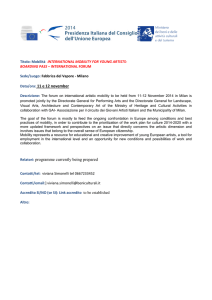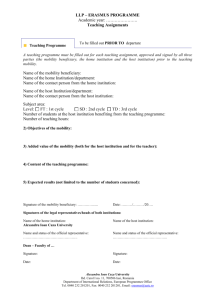Global Mobility Roundtable - National Foreign Trade Council
advertisement
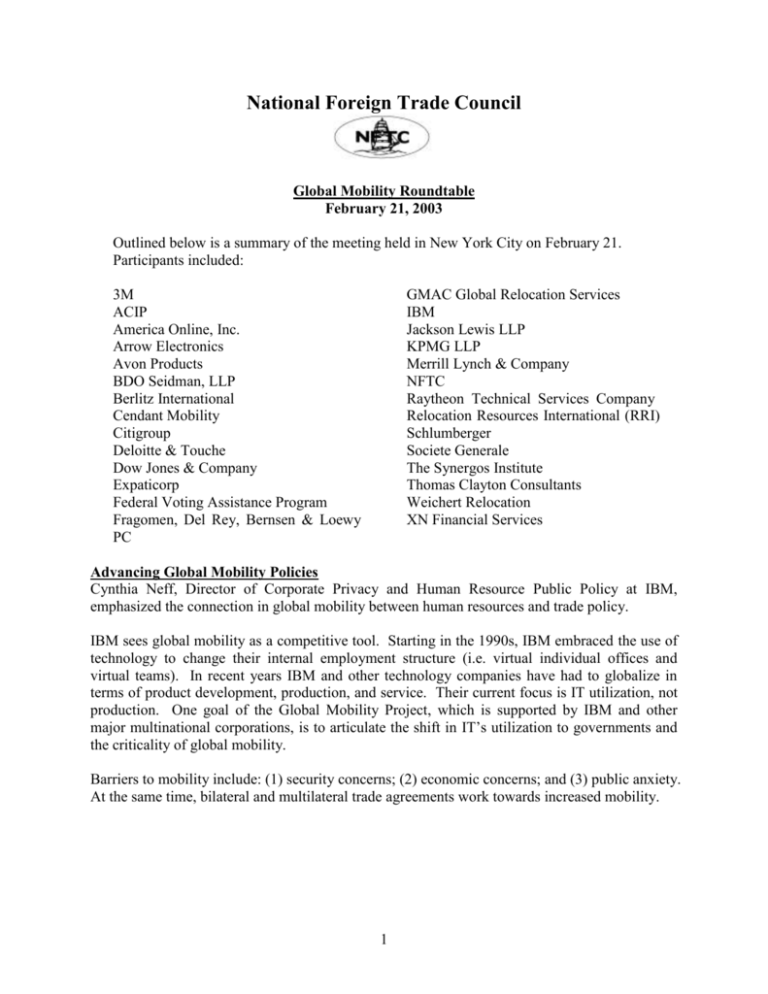
National Foreign Trade Council Global Mobility Roundtable February 21, 2003 Outlined below is a summary of the meeting held in New York City on February 21. Participants included: 3M ACIP America Online, Inc. Arrow Electronics Avon Products BDO Seidman, LLP Berlitz International Cendant Mobility Citigroup Deloitte & Touche Dow Jones & Company Expaticorp Federal Voting Assistance Program Fragomen, Del Rey, Bernsen & Loewy PC GMAC Global Relocation Services IBM Jackson Lewis LLP KPMG LLP Merrill Lynch & Company NFTC Raytheon Technical Services Company Relocation Resources International (RRI) Schlumberger Societe Generale The Synergos Institute Thomas Clayton Consultants Weichert Relocation XN Financial Services Advancing Global Mobility Policies Cynthia Neff, Director of Corporate Privacy and Human Resource Public Policy at IBM, emphasized the connection in global mobility between human resources and trade policy. IBM sees global mobility as a competitive tool. Starting in the 1990s, IBM embraced the use of technology to change their internal employment structure (i.e. virtual individual offices and virtual teams). In recent years IBM and other technology companies have had to globalize in terms of product development, production, and service. Their current focus is IT utilization, not production. One goal of the Global Mobility Project, which is supported by IBM and other major multinational corporations, is to articulate the shift in IT’s utilization to governments and the criticality of global mobility. Barriers to mobility include: (1) security concerns; (2) economic concerns; and (3) public anxiety. At the same time, bilateral and multilateral trade agreements work towards increased mobility. 1 The Global Mobility Project has identified the following issues, problems, and possible solutions. The principles for reform include: (1) Security precertification and biometrics (2) Efficiency – use of electronic filing (3) Government/private sector partnerships (4) Harmonization – common definitions of terminology and mutual recognition (5) Expediting permanent residency status The next steps include: (1) Expanded corporate involvement (2) Reform at the national level (3) Reform at the international level The Global Security Situation: How to Continue to do Business in Dangerous Locations George Hall of Thomas A. Clayton Consultants spoke on the topic of global security in terms of issues of political kidnappings, kidnappings for ransom, inefficient judicial systems, corrupt police, and poor economic conditions. Latin America leads the world in kidnappings for ransom. The kidnappers are sophisticated in who they target. In light of this danger, companies should educate potential victims and employees about how to become harder targets by, for example, changing daily routines and travel patterns and being more aware of surroundings. Employers should also have a “crisis committee” that will bring appropriate resources to bear on the problem. Key managers in each country have to be briefed on what to do when an incident occurs. George cited a number of case studies. In most situations, the primary goal of the kidnappers was economic. Developing, Managing, and Retaining a Global Workforce Scott Thompson, Human Resource Services Manager of Schlumberger, described their global workforce practices. Today Schlumberger has 84,000 employees worldwide, with 140 nationalities working in 100 countries. They consciously try to match up their workforce with the geographic sources of their revenue. They currently work with 45 “ambassador” universities where they actively recruit. Schlumberger’s Human Resource group was reorganized into an employee services unit and an employee motivation unit that focuses on management development and succession planning. Recruiting is also done on-line, even in countries that are not technologically advanced. Scott shared their learnings in developing the e-HR tools. Key to Schlumberger’s success are its longterm relationships with key faculty and department heads. Federal Voting Assistance Program Polli Brunelli, Director, and Carol Paquette of the Federal Voting Assistance Program, described the act that allows U.S. citizens who reside overseas to vote. There are an estimated six million citizens residing abroad. An electronic registration and voting experiment is underway with the goal of using the system beginning in January 2004. Congress has authorized ramping up capability to expand the project’s scope. 2 Immigration in 2003: New Department, New Congress, New Challenges Gary Merson, Government Affairs Counsel of Fragomen, Del Rey, Bernsen & Loewy PC, briefed the audience about current issues and challenges related to business-sponsored immigration. The combination of security concerns and a weak economy negatively affect cross-border business. Gary recognized the significance of such new legislation as the USA Patriot Act and the Child Status Protection Act. Gary then reviewed expected changes under the new 108th Congress. One issue he raised is the level of the H-1B cap falling back to 65,000 after September 2003. He also described possible security initiatives, i.e. visa waivers for certain countries and the tracking of visitors. One recommendation is to precertify employers. In addition, he noted that INS will be broken into two sections, the Bureau of Citizenship and Immigration Services and the Bureau of Immigration and Customs Enforcement. Expatriate Cost Management & Reporting Eric Bachmann, Director of Global Assignment Services at Merrill Lynch, made a presentation on expatriate cost management and reporting. Merill Lynch has shared service teams in London, Hong Kong, New York, and Tokyo. Eric described business factors starting with the slowing of the economy in 2000, changes in the top management of the firm, and the aftermath of September 11. One result was a 33% reduction in expatriate staff. Their opportunities to save per capita costs included (1) selection of assignment types; (2) reduction of entitlements; and (3) lump sum packages. Using the Six Sigma process, Merrill Lynch identified key cost drivers and other variables, benchmarked against competitors’ costs, and provided analytics to senior management. Their goal is to manage ROI and expatriation as assets. Issues to consider include: (1) Assignment administration (2) Transparency (3) Impact on mobility (4) Impact on overall savings (5) Competitive practices The next meeting of the Global Mobility Roundtable will be on April 29, 2003 at the Yale Club of New York City. For further information, contact Denise Schulman at dschulman@nftc.org or 212-399-7128. 3
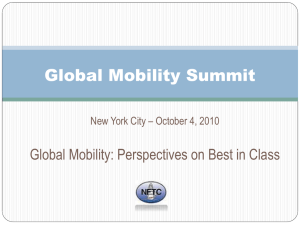


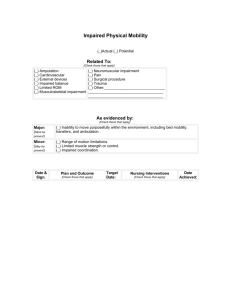
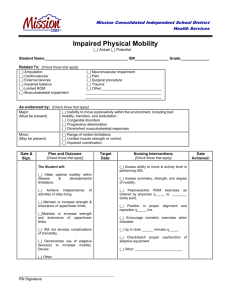
![CHEER Seminar Promo: 2nov2015 [DOC 142.50KB]](http://s3.studylib.net/store/data/007520556_1-22ae8f83ff74a912c459b95ac2c7015c-300x300.png)
